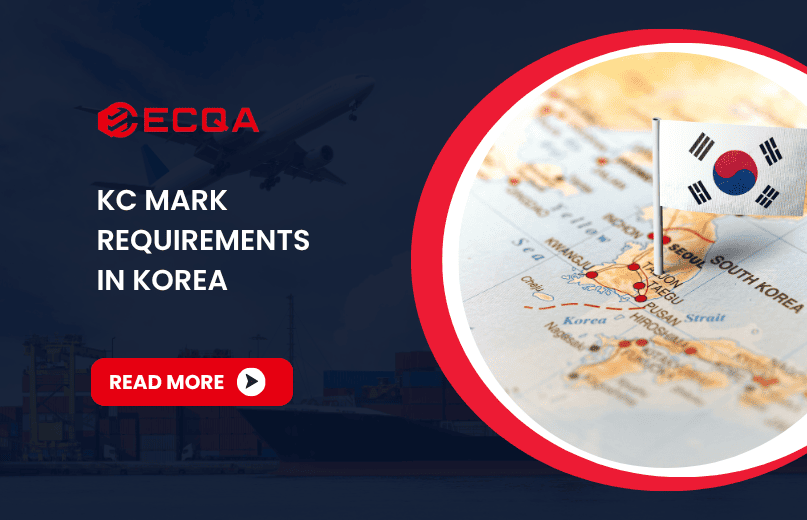
KC Mark Requirements in Korea
The KC (Korea Certification) Mark is the national conformity assessment mark of South Korea, indicating that a product meets the country’s safety, electromagnetic compatibility (EMC), and radio frequency (RF) requirements. It ensures that electrical and electronic products distributed in the Korean market are compliant with the Korean Agency for Technology and Standards (KATS) regulations and relevant technical standards.

Understanding the KC Mark System in South Korea
The Korea Certification Mark, abbreviated as KC, was introduced to unify multiple safety certification systems into a single national mark. Its implementation is governed primarily by the Electrical Appliances and Consumer Products Safety Control Act and the Radio Waves Act, administered by KATS under the Ministry of Trade, Industry and Energy (MOTIE).
The KC mark covers a broad range of product categories including electrical appliances, consumer electronics, lighting equipment, IT devices, and wireless communication products. For electrical and electronic goods, certification ensures conformity in three key aspects: safety, EMC performance, and radio communication stability.
Products subject to KC certification are divided into three types of control systems:
- Safety Certification (Compulsory) – For high-risk electrical appliances such as refrigerators, washing machines, and power tools.
- Safety Confirmation (Semi-compulsory) – For medium-risk products such as computer peripherals, LED lamps, or chargers.
- Supplier’s Declaration of Conformity (SDoC) – For low-risk electronic goods where manufacturers self-declare compliance after testing in accredited laboratories.
The purpose of the KC mark system is to establish a reliable mechanism for consumer protection, product safety assurance, and market transparency. Manufacturers, importers, and distributors must ensure that all regulated products bear a valid KC mark before being sold or distributed within Korea.
What products require KC certification?
Under the Electrical Appliances and Consumer Products Safety Control Act, KC certification is mandatory for specific categories of electrical and electronic goods that present potential safety or fire hazards. The scope includes core electrical components and finished consumer appliances.
Examples of regulated products include:
- Power cords, wiring assemblies, and electrical cables
- Switches, plugs, and socket-outlets
- Capacitors, filters, and power supply units
- Electrical connectors and component parts used in appliances
- Circuit protection devices such as fuses or breakers
- Transformers and voltage converters
- General household appliances such as fans, heaters, and refrigerators
These categories are defined by the KATS and are subject to periodic updates. Manufacturers and importers are responsible for verifying whether their products fall under the regulated list before shipment or sale in Korea.
Key Safety and EMC Requirements for Electronic and Electrical Products
KC certification covers several technical aspects that verify product safety and electromagnetic compliance. Each product category is subject to defined Korean Industrial Standards (KS), harmonized with international frameworks such as IEC and CISPR.
Electrical Safety Requirements
Electrical safety testing under KC certification evaluates the potential hazards associated with electrical appliances. The typical scope includes:
- Insulation resistance and dielectric strength to prevent electric shock.
- Leakage current measurement to ensure compliance with permissible safety limits.
- Temperature rise and flammability testing to confirm safe operation under continuous use.
- Grounding and protective earthing checks for metal-bodied devices.
- Abnormal operation and mechanical strength testing to assess durability under fault conditions.
Manufacturers must design their products according to the applicable KS C IEC standards and submit them to a designated testing institution.Products that fail to meet safety thresholds cannot be imported or distributed until re-evaluation is completed.
EMC (Electromagnetic Compatibility) Requirements
EMC testing ensures that the product’s electromagnetic emissions do not interfere with other devices and that it remains immune to interference from external sources. Two main parameters are tested:
- Electromagnetic Emission (EMI) – Measures unwanted radiated or conducted noise generated by the device.
- Electromagnetic Immunity (EMS) – Evaluates the device’s resilience when exposed to electromagnetic interference.
EMC compliance is mandatory for most electronic and communication products. Testing is performed under standards based on KS C CISPR and KS C IEC 61000 series. Products with wireless or radio frequency components undergo additional RF performance tests as per Radio Waves Act guidelines.
Radio Frequency and Wireless Equipment Approval
Devices with Bluetooth, Wi-Fi, or cellular modules must be approved by the National Radio Research Agency (RRA). RF certification verifies that radio wave emissions are within Korean frequency regulations and that communication performance is stable and safe for public use.
The RRA manages frequency allocation, spectrum efficiency, and compliance with Korea’s Electromagnetic Wave Act. Wireless equipment requires separate labeling for radio type approval along with the KC mark.
KC Certification Process and Required Documentation
Obtaining the KC mark involves a defined sequence of administrative and technical procedures. The process depends on the product type and the applicable control system (Safety Certification, Safety Confirmation, or SDoC). For most electrical and electronic products, the process follows these standard steps:
Step 1: Product Classification and Standard Identification
Manufacturers must first identify whether the product falls under a compulsory, semi-compulsory, or SDoC category. KATS maintains an official database of regulated products, each linked to specific KS standards and test items.
Step 2: Selection of Designated Testing Body
Once the category is determined, applicants must select a designated testing organization approved by KATS, typically KTL (Korea Testing Laboratory), KTC (Korea Testing Certification), or KTR (Korea Testing & Research Institute). These institutions perform product testing and issue the test reports required for certification.
Step 3: Sample Submission and Technical Review
Applicants submit product samples, circuit diagrams, operation manuals, and detailed component lists for examination. The testing body conducts all required safety and EMC tests according to the relevant KS standards. The review also includes inspection of product labeling, user instructions, and electrical ratings.
Step 4: Factory Audit (for Safety Certification)
Products under the safety certification category require a factory audit. Inspectors assess the manufacturer’s quality management system, production control procedures, and test facilities. Factories outside Korea may undergo remote or on-site audits depending on KATS requirements.
Step 5: Approval Issuance and Registration
Once testing and factory audits are completed, the certification body issues the KC certificate. The product is then registered in the KATS database. Manufacturers receive authorization to affix the KC mark on the product label and packaging.
KC Mark Documentation Requirements
The following documents are typically required:
- Application form and product information sheet.
- Circuit diagrams, PCB layout, and schematic drawings.
- Component lists and safety data sheets.
- User manual and product label artwork.
- Test reports from the designated testing institution.
- Factory audit report (for safety certification).
Certification validity usually extends for five years, after which products must undergo renewal testing or documentation review. Any modification in product design, components, or manufacturing site requires re-assessment before continued use of the KC mark.
Role of KTL, KTC, and KTR in the KC Certification Framework
KC certification relies on an integrated network of authorized laboratories and inspection agencies. The three primary organizations recognized by KATS are KTL, KTC, and KTR. Each has specialized roles in testing and certification activities.
KTL (Korea Testing Laboratory)
KTL is Korea’s largest state-run testing institution under MOTIE. It performs comprehensive testing for electrical safety, EMC, environmental reliability, and energy efficiency. KTL laboratories are KOLAS-accredited to ISO/IEC 17025, ensuring international recognition of test results. Manufacturers often choose KTL for complex electrical and communication products due to its broad testing capabilities.
KTC (Korea Testing Certification)
KTC focuses on product safety evaluation, conformity certification, and factory inspection. It issues official KC certificates for various categories including household appliances, industrial equipment, and lighting products. KTC is widely used by manufacturers seeking full-service solutions covering both product and factory assessments.
KTR (Korea Testing & Research Institute)
KTR provides testing for materials, chemistry, textiles, and electrical components. It handles environmental and RoHS compliance as well as chemical safety testing required for consumer products. KTR’s expertise is often used by exporters handling multiple product types or seeking cross-compliance with REACH or CE standards.
Collaboration with KOLAS and ISO/IEC 17025 Accreditation
All KC-designated laboratories operate under the Korean Laboratory Accreditation Scheme (KOLAS), which ensures adherence to ISO/IEC 17025 quality principles. This alignment guarantees consistency and reliability of test results, supporting the mutual recognition of conformity assessments between Korea and other markets.
Manufacturers are advised to coordinate directly with the testing institution that best matches their product scope and to maintain ongoing communication during sample submission and evaluation stages.
Labeling, Post-Market Control, and Common Compliance Challenges
KC Mark Labeling Requirements
Every certified product must display the KC mark on the product body, nameplate, or packaging. The mark must be clear, durable, and proportionally scaled. Alongside the logo, additional information such as the certification number, model name, rated voltage, and manufacturer’s name must be included.
Products approved under RF or EMC testing may also require supplementary identification, such as the RRA registration number. Mislabeling or omission of required information can result in penalties, product recall, or suspension of import rights.
Post-Market Surveillance and Inspection
After certification, products remain subject to ongoing post-market surveillance conducted by KATS and the RRA. Authorities perform random inspections, sample testing, and documentation checks to verify continued compliance. Non-conforming products may be subject to withdrawal orders or cancellation of certification.
Common Challenges in KC Compliance
Several recurring issues delay KC certification or result in non-compliance:
- Incorrect product classification under the wrong KC category.
- Missing or incomplete technical documentation.
- Failure to meet insulation or EMC emission standards during testing.
- Inconsistent labeling or missing certification numbers.
- Insufficient factory quality control or audit preparation.
Early consultation with a KC-accredited laboratory and pre-assessment testing can minimize the risk of rework or delays. Manufacturers should establish clear documentation systems aligned with ISO 9001 or equivalent quality management standards to support continuous compliance.
Integrating KC Certification into Global Conformity Systems
Many exporters integrate KC certification within their global compliance framework, along with CE marking, FCC, or CCC certification. Aligning design and testing processes with international safety standards reduces duplication and ensures faster approval across multiple markets.
KC certification remains a mandatory and essential requirement for electrical and electronic products entering the Korean market. It validates a product’s safety, electromagnetic stability, and reliability under national standards. Compliance demonstrates that a manufacturer maintains proper quality control, uses certified components, and follows Korean industrial requirements.
FAQs of KC Mark Requirements in Korea
1. What is the KC mark used for in Korea?
The KC mark (Korea Certification Mark) is a national conformity mark that confirms a product meets Korean safety, EMC, and radio frequency standards. It is required for most electrical, electronic, and wireless products sold or imported in South Korea.
2. Which products need KC certification?
KC certification applies to electrical appliances, IT equipment, lighting products, machinery, and wireless communication devices. The exact requirement depends on the product category, which is defined under the Electrical Appliances and Consumer Products Safety Control Act and the Radio Waves Act.
3. Who issues the KC certification in South Korea?
KC certification is managed by the Korean Agency for Technology and Standards (KATS) under the Ministry of Trade, Industry and Energy (MOTIE). Testing and evaluation are conducted through designated institutions such as KTL, KTC, and KTR.
4. What happens if a product is sold without KC certification?
Selling or distributing products without valid KC certification can lead to fines, sales bans, or product recalls under Korean law. Importers and manufacturers are legally responsible for ensuring that all regulated products bear the correct KC mark and comply with post-market surveillance.

 Request Free Sample Report
Request Free Sample Report